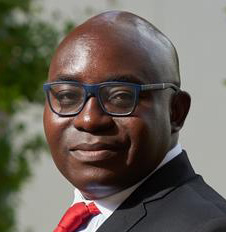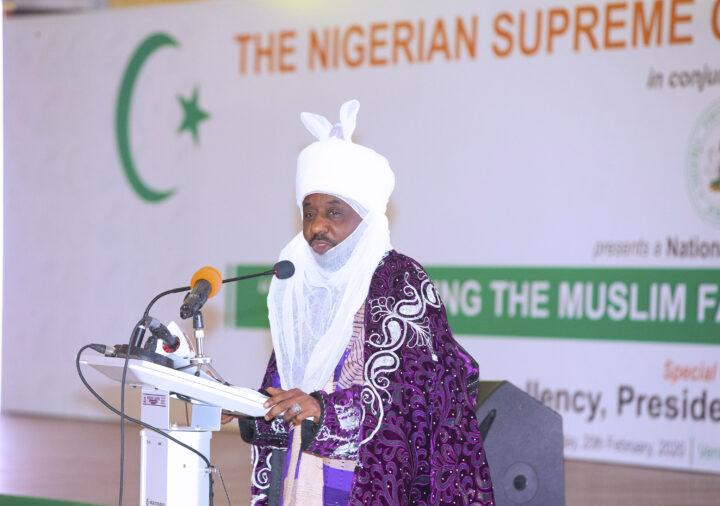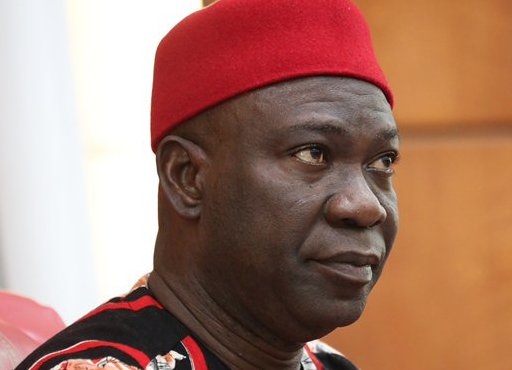PRESIDENT BUHARI AND FIRST ATTENDS MUSLIM FAMILY VALUES. 3C The Emir of Kano, HIS Highness Muhammadu Sanusi 11 Sarkin Kano speaking during the national Conference of repositioning the Muslim Family for National Development organised by future Assured and Nigeria Supreme Council for Islamic Affairs (NSCIA) held at the State House Banquet Hall Presidential Villa. Abuja. PHOTO; SUNDAY AGHAEZE. FEB 20 2020
Practical reason was on its feet last Monday in Kaduna on the question of the “northern condition.” It wore the full regalia of trado-religious institution with unfussy elegance, but it was speaking the language of one of the main pillars of the Enlightenment. Practical reason took the sword to the corrosive heart of ignorance, poverty and want in “northern Nigeria,” and slashed it open for all to see – again. “If the north does not change,” declares practical reason, “it will destroy itself.”
We have all come to expect strident, even controversial, declamations from the Emir of Kano, Mohammadu Sanusi II, whenever he speaks about public matters. He has walked his way into more than his own fair share of trouble for verbally afflicting the power vortex that produced, nurtured, but now exasperates and threatens him. Not a few have concluded that he has a fatal fascination with the fate that befell his grandfather, Sir Muhammadu Sanusi I, KBE, in 1963. Despite the failing attempts by some to make him abandon the path of reason for the sake of class-inflected safety, it is obvious that the Sarkin Kano is too deeply violated by the dehumanising conditions of the masses of the north, particularly the children, the youth and women, to keep his peace.
Though he started his speech with disclaimers about what he was not about to say, we were not surprised about what we assumed he was going to say. Still, there was a certain judgement, clarity, stridency to what the Emir said at the 60th birthday celebrations of his friend and Governor of Kaduna State, Mallam Nasir El-Rufai, that I concluded that this occasion was different. (I was in the audience to review the two volumes presented at the event.) There was nothing absolutely new about what the Emir said on 17th February. No serious person in the audience, and no engaged observer of the ‘northern condition,’ would have found the statistics he marshalled to cement his argument outlandish, though they were damning. Yet, there was something about his gaze and demeanour when he spoke that gave me the impression that this time, and on this occasion, the Emir was making a declaration: Come what may, I cannot make peace with perfidy.
The betrayal of the good people of the north, its forgotten population, particularly the children, youth and women, seemed to have reached a point for which the Emir is prepared to risk his throne. Indeed, you could say he was throwing his throne, like a missile, at the treachery which masquerades as leadership in the north of our commonwealth, sorry, common-poverty. This is why, I believe, practical reason was on its feet a few days ago in Kaduna. As the philosophers remind us, practical reason speaks to the human capacity for using reflection to resolve questions about what is one to do regarding the conditions of one’s society.
Advertisement
“The truth is,” the Emir declared, “if you look at what Nasir [El-Rufai] is doing in Kaduna, with 40 percent of his budget in education, that is the only thing that is going to save the north. I know that when we say these things, they don’t go down well.”
He invoked the example of enlightened leadership in the defunct Western Region to demonstrate the transformative power of education. “There was a man called Chief Obafemi Awolowo,” stated the Sarkin Kano. For the avoidance of doubt, he reminded the audience that Awolowo faced serious opposition, even among the people he was devoted to helping, when he started the free education programme that transformed Western Nigeria forever. He cited the examples of the farmers who were initially organised against Awolowo, and also of the women who protested some of the constraints of the new dawn that Awolowo midwifed. But because the man of vision saw far beyond the horizon of the masses, the Emir implied, when the people eventually saw the benefits of universal primary education, they not only embraced the future, but also embraced the man who saw that future.
As one of the most cerebral Nigerians that ever lived, the banker turned Emir knows that the north is in urgent need of a revolution (not his word, and in case the SSS is “listening”, I am only borrowing this word from Omoyele Sowore, pending the resolution of his trial!).
Advertisement
Declared Mohammadu Sanusi, “If the north does not change, the north will destroy itself. The country is moving on. The quota system that everybody talks about must have a sunset clause. The reason people like Nasir stand up and they are nationalists is that they don’t have any sense of inadequacy. So, as we celebrate Nasir at 60, we need to celebrate him as a public officer who is addressing the core problems of his constituency. It is education, it’s girl child education, it’s women’s right, it’s child begging, it is parental irresponsibility, demographic growth, it’s managing a multicultural, multi-ethnic and multi-religious society and bringing them into one community where they are all citizens …. You don’t need to rise on being from Kaduna State or being from the north or being a Muslim to get a job, you come with your credentials, you go with your competence, you can compete with any Nigerian from anywhere.”
I do not agree with the Emir, though, that, if the north does not change, the fatal consequences will only be felt in the north – or that the rest of the country is “moving on.” As the current reality in Nigeria shows, it is not only the north but the entire country that will be destroyed if the north does not change. For instance, the problem of the almajiri may be the immediate problem of the north, but, ultimately, it is the problem of the whole polity. Whatever happens to the north will eventually happen to Nigeria, unless and until the atavistic logic on which the country is being run is abandoned – as the Emir correctly warned.
Sanusi concluded thus: “The truth is, nobody who is a leader in northern Nigeria today can afford to be happy. You cannot be happy with about 87 percent of poverty in Nigeria being in the north. You can’t be happy with millions of northern children out of school. You can’t be happy with nine states in the North contributing almost 50 per cent of the entire malnutrition burden in the country.”
The Emir spoke not only stridently, but also with urgency. He spoke with his usual aplomb, but also in indignation. He was not speaking to power. If you listened to him, you will realise that he recognised that we were past that. No, he was giving power to the truth. He was rendering a harangue against power; or the thoughtlessness that had and still masquerades as power in the land. If power still had some shame and a measure of dignity and decency, perhaps the Sarkin Kano would have spoken some truth to it. But power in Nigeria has since shown, repeatedly, serially, and rather unrepentantly and remorselessly, that it is deaf to the truth, blind to the reality of the approaching paralysis. Power cannot see the millions of the almajiris that the Emir was speaking for; if it sees them, it is only to mobilise them to capture or hold on to more power. Power does not see future nuclear scientists, medical doctors, engineers, philosophers, etc. in these children; it only sees urchins.
Advertisement
In fact, power has even almajirised millions of others who were not originally called the almajiri. The same conditions that keep those children in utter poverty and illiteracy, drove several thousands out of Nigeria. The forces that unleash itself as hunger and want in the lives of those children, have made a different order of almajiri of millions of their compatriots in the Niger Delta. For every almajiri that is born and reborn into the anguish of misery, there is another, not similarly named, trying to make his or her way out of southern Nigeria through several dangerous means – including through the desert of north Africa – only to perish in the Mediterranean in a fruitless effort to reach Europe.
So, let the Emir know this: it is not just a problem of the north, it is our collective problem.
And because this is especially true, the totality of our national elite share of responsibility for resolving the problems that produced and reproduce the violent shame of the Hobbesian life that these children and the youth of the north are living. Again, the elite of the north may bear primary responsibility, but ultimately, it is the collective responsibility of the national elite. As the Sarkin Kano so eloquently articulated it, it is this power-besotted, amoral, and misbegotten faction of the national elite that had, through its greed and historic irresponsibility, fostered this crisis on the country. Yet, the general responsibility is shared. They have collaborators and abettors from every part of Nigeria.
However, given the burden of illiteracy, ill-health, and want that the almajiri have borne for so long, we must now collectively acknowledge and share their misery, starting with the harsh tag, #itooi’malmajiri! If we start with this, we will be acknowledging a socio-economic and political fact already evident decades before the world became hash-tagged. Is it possible for us all to start bearing this hashtag in an attempt to shame and shock those responsible for this condition? If we do so, we would have been late in sharing their misery; yet, we would be pressing the social media into yet another service regarding a crucial aspect of our common humanity. If so, we can use that moment of national acknowledgement in moving to the next stage of ending this phenomenon – #makealmajirihistory!
Advertisement
Even though it is a manifestation of a fundamental crisis of the Nigerian state, beyond the specific problem of the almajiri, our most crucial rallying cry must be the termination of the British, specifically Lugardian, notion of Nigeria – which is shared by the ruling elite: a self-despising amalgam of irreconcilable cultural, religious and political differences, held together by violence, vice and greed. Let us also make that Lugardian (il)logic history. The Emir is indirectly beckoning us all – not only the elite of the north – to a new reckoning: Nigeria can and must work. But to do so, we must dispense with the prevailing irrationality that has turned her into an urchin state.
Adebanwi is the Rhodes Professor of Race Relations and Director of the African Studies Centre, University of Oxford, UK.
Advertisement







